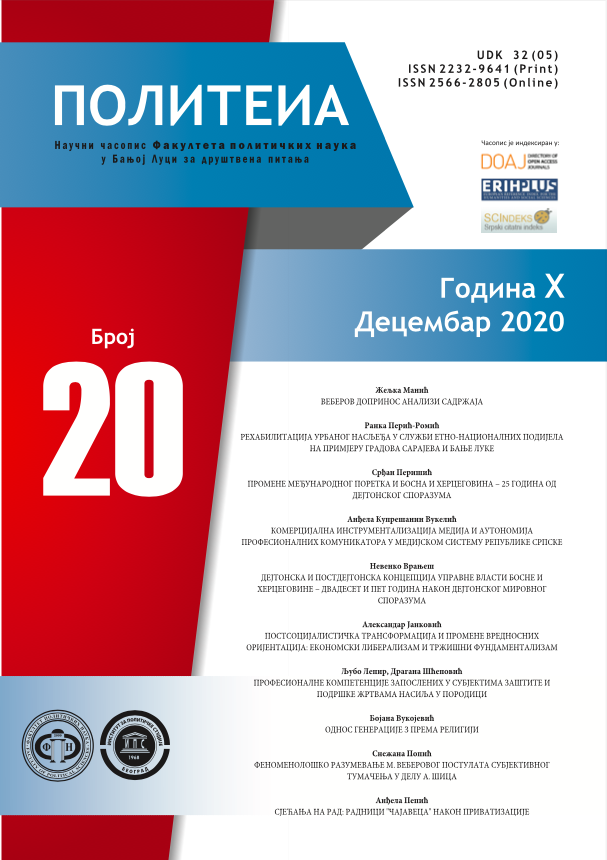WEBER'S CONTRIBUTION TO CONTENT ANALYSIS
Abstract
The subject of this paper is Max Weber's contribution to content analysis as a sociological research procedure. Content analysis gained the legitimacy of the sociological method of research in the middle of the 20th century, and Weber occupies a significant place in its history. He used the basic idea of content analysis in “The Protestant Ethic and the Spirit of Capitalism” (1904-1905). Weber drew conclusions about the institutionalised form of social communication in the past by studying its recorded content. He analysed the content of protestant catechisms to establish whether, in working with believers, pastors encouraged ethical attitudes conducive to the development of the capitalistic spirit. Later, at the first meeting of the German Sociological Society (1910), Weber proposed undertaking a comprehensive analysis of the content of the press, which did not receive the support of sociologists. His proposal represents the first methodologically designed attempt to give content analysis a place among sociological research procedures. The aim of this paper is to present Weber's contribution to content analysis. His contribution is considered through an analysis of the application of the basic idea of this procedure in ‘The Protestant Ethics and the Spirit of Capitalism’ and through advocating its use in speech at the first meeting of the German Sociological Society.
References
Berelson, B. (1952). Content Analysis in Communication Research. Glencoe, Ill: Free Press.
Fajgelj, S. (2010). Metode istraživanja ponašanja. Beograd: Centar za primenjenu psihologiju.
Đurić, M. (1987). Sociologija Maksa Vebera. Zagreb: Naprijed.
Gredelj, S. (1986). S onu stranu ogledala. Beograd: Istraživačko-izdavački centar SSO Srbije.
Ilić, V. 2016. Posmatranje i analiza sadržaja. Beograd: Filozofski fakultet, Univerzitet u Beogradu.
Jovanović Ajzenhamer, N. M. (2019). Veberovo shvatanje značaja ratničkog ethosa za nastanak i razvoj islama. Doktorska disertacija odbranjena na Odeljenju za sociologiju Filozofskog fakulteta u Beogradu.
Krippendorff, K. H. (2004). Content Analysis: An Introduction to Its Methodology, Thousand Oaks, London, New Delhi: SAGE Publications.
Krippendorff, K. & Bock M. A. (eds.), (2009). The Content Analysis Reader, Thousand Oaks, CA: SAGE Publications.
Lazarsfeld, P. F. & Oberschall A. R. (1965). Max Weber and Empirical Social Research, American Sociological Review, 30 (2): 185-199.
Manić, Ž. (2017). Analiza sadržaja u sociologiji. Beograd: Čigoja štampa i Institut za sociološka istraživanja Filozofskog fakulteta u Beogradu.
Milić, V. (1996). Sociološki metod. Beograd: ZUNS.
Mommsen, W. J. (2000a). Max Weber in America, The American Scholar, 69(3): 103‒109.
Mommsen, W. J. (2000b.). Max Weber's „Grand Sociology”: The Origins and Composition of Wirtschaft und Gesellschaft: Soziologie. History and Theory. 39 (3): 364‒383.
Veber, M. (2011). Protestantska etika i duh kapitalizma. Novi Sad: Mediterran publishing.
Weber, M. (2009). Towards a Sociology of the Press: An Early Proposal for Content Analysis, in: Krippendorff, K. & Bock M. A. (eds.), The Content Analysis Reader, Thousand Oaks, CA: SAGE Publications.
Woodward, J. L. (1934). Quantitative Newspaper Analysis as a Technique of Opinion Research. Social Forces. 12, (4): 526‒537.
Sapienza, Z. S., Iyer, N. & Veenstra. A. S. (2015). Reading Lasswell's model of communication backward: Three scholarly misconceptions. Mass Communication and Society, 18 (5): 599‒622.
Autori koji objavljuju u ovom časopisu pristaju na sljedeće uslove:
- Autori zadržavaju autorska prava i pružaju časopisu pravo prvog objavljivanja rada i licenciraju ga "Creative Commons Attribution licencom" koja omogućava drugima da dijele rad, uz uslov navođenja autorstva i izvornog objavljivanja u ovom časopisu.
- Autori mogu izraditi zasebne, ugovorne aranžmane za neekskluzivnu distribuciju članka objavljenog u časopisu (npr. postavljanje u institucionalni repozitorijum ili objavljivanje u knjizi), uz navođenje da je članak izvorno objavljen u ovom časopisu.
- Autorima je dozvoljeno i podstiču se da postave objavljeni članak onlajn (npr. u institucionalni repozitorijum ili na svoju internet stranicu) prije ili tokom postupka prijave rukopisa, s obzirom da takav postupak može voditi produktivnoj razmjeni ideja i ranijoj i većoj citiranosti objavljenog članka (Vidi Efekti otvorenog pristupa).

